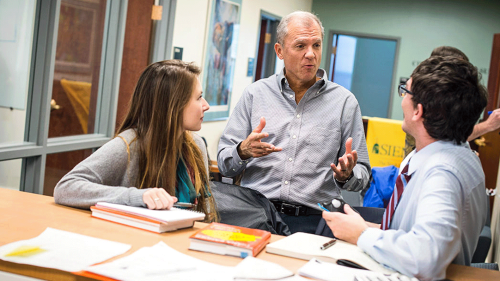
According to the CDC, three out of four Americans between the ages of 18 and 24 report poor mental health tied to the pandemic. But even pre-Covid, colleges were catching on more than ever that your mental health is something we need to not only address, but nurture and check in on.
Now that most colleges have had time to pivot their priorities and address the most pressing needs for this fall, we encourage you—on your search for the perfect college for you—to inquire about this very thing.
So what should you look for?
We asked Kate Kaufman Burns, MSW, LCSW-R, Siena College’s Director of Health Promotion for what she believes every college campus needs to support student health. Take a look.
1. A counseling center with experienced mental health practitioners that is available to students 24 hours a day, 7 days a week. “They should have a wide-range of combined clinical expertise and experiences that are relevant to understanding the special joys and challenges involved in supporting the mental and emotional health of the student body,” she says.
2. A dedicated Health Promotion or Wellness Office. “One that works closely with the Counseling Center,” says Kate, “and provides education, outreach, programs, assessment, and support for students around a multi-dimensional approach to well-being: mental health, physical health / nutrition / fitness, relationship health, spiritual health and whole-person well-being.”
3. A vibrant group of student wellness leaders, “who champion and support their peers who may be struggling with alcohol or other drug use, unhealthy relationships, anxiety, depression, or a host of challenges that face many college students.” It’s difficult, explains Kate, for many young adults to reach out for help or to seek support from mental health professionals—so often they turn to their peers first. “You want to choose a college that makes sure those peers are ready to do the work of compassionate care and connection to campus resources when the time comes.”
4. A supportive administration that underscores the student life experience. Find out about their commitment to investing time, energy and resources into supporting programs and recruiting necessary personnel to ensure that every student has the ability to thrive and flourish, says Kate—in the classroom, and in their lives.
5. And a supportive admissions team. “When confided in by a prospective student or family member about a part of their story that requires integrated and accessible resources to support their mental and emotional well-being, without hesitating or stumbling, an admissions counselor should be able to connect that student or family to the people and places on campus that exist because they care deeply about the health, safety and well-being of each and every student.”
At Siena, that’s what our team does: enters into a relationship in a customized and personal way, to ensure you will have the support, safety and encouragement you need to have the most authentic and transformative education possible.
Want to hear more about our mental health efforts? Ask your admissions counselor or anyone on our team—we’re here for you.

